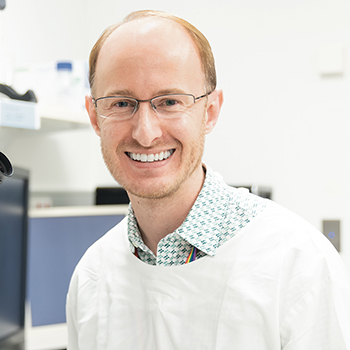As a neurobiologist, Dr Adam Walker is no stranger to a challenge – his job is to study the tiniest building blocks in our body to understand why motor neurone disease (MND) happens so we may discover ways to treat, cure or prevent it.

Dr Walker joined UQ’s Queensland Brain Institute (QBI) in 2018 as the Ross Maclean Senior Research Fellow, a dedicated MND research position established in 2004 in memory of local businessman Ross Maclean, who died in 2005 after being diagnosed with MND.
The almost two-decade-long relationship between the Maclean family and QBI started in 2003, when Ross met Emeritus Professor Perry Bartlett AO – a world-renowned neuroscientist and one of the only local researchers working on MND.
In creating the fellowship just prior to his passing, Ross bore arguably the greatest generosity of all: while he knew he would never benefit from the research, his hope was to be a part of the solution to prevent future generations from experiencing the terrible disease.
Emeritus Professor Bartlett says the original gift and continued support from Ross’s family and business has had a transformative impact on MND research at QBI.
"Ross’s vision, all those years ago, has helped us to get to where we are today: we have a team of dedicated, multidisciplinary MND researchers tackling the problem from a number of angles. Full approval for the Phase 1 EphA4 Clinical Trial has been granted, which will commence in February,” Emeritus Professor Bartlett said.
“The fellowship has attracted some brilliant researchers to QBI – including Dr Walker – who have made amazing progress in understanding the basic molecular principles that underly MND.
“Breakthroughs take time, and Ross knew that. He’d be proud to see how close we are.”
The focus of Dr Walker’s research is a protein known as TDP-43, which binds to DNA and might hold the secrets to understanding MND.
“TDP-43 is an essential protein: everybody has it in every part of their bodies, but when things go wrong, it can lead to the pathology we see in people with MND,” Dr Walker said.
“In almost all people who have died from MND, we know that the TDP-43 protein has malfunctioned and clumped together abnormally in neurons in the brain and spinal cord.”
However, how this leads to MND remains unclear – a problem the Walker Lab is trying to solve.
Prior to joining UQ, Dr Walker developed a genetically modified TDP-43 mouse model that – for the first time – showed the key progressive pathological, neurodegenerative and behavioural features of human MND, a vital tool in accurately investigating how the disease works and testing therapeutics.
Since 2018, Dr Walker’s team have been studying the biochemical changes that occur throughout disease in these mice. They have identified several potential therapeutic targets that can prevent TDP-43 from clumping abnormally, and are now testing drugs and gene therapies that have the potential to slow down disease progression and prevent neuron death. This is an essential next step towards developing a treatment for people living with MND.
In 2020, the team applied cutting-edge genetic engineering techniques to identify genes that prevent TDP-43 clumping or protect affected cells from dying. This work, led by the FightMND Early Career Fellow Dr Rebecca San Gil in collaboration with the UQ Genome Innovation Hub, has identified hundreds of new genes that could be involved in triggering MND. The team are now using this information to narrow down which genes could be targeted for therapies.
For Dr Walker, the fellowship has been an opportunity to grow his research group to a 10-strong team of students, research assistants and postdoctoral fellows all focused on MND. Without the funding, the ‘risky’ experiments – which are difficult to gain traditional grant funding for, but have provided a treasure trove of new information in the fight against MND – would not have been possible.

“Being the Ross Maclean Fellow is an honour and a highlight of my career, and it is a real privilege to have the support of the Maclean family and of everyone who has donated and volunteered to raise funds for this research,” Dr Walker said.
“I hope that the work we do helps to realise the vision that Ross had of a world without MND.”
Alongside the fellowship, Dr Walker’s lab has benefited from the generosity of several donors throughout the campaign, including Bob and Pam MacDonnell and the Crommelin Family Foundation, who supported the purchase of a next-generation protein imaging machine. With accesses to such world-class research facilities, the lab has the support to move faster towards finding solutions for people living with MND.
Because of you, the good doesn’t stop.



